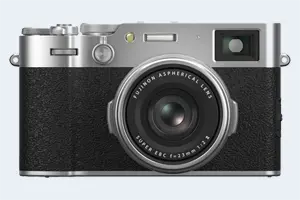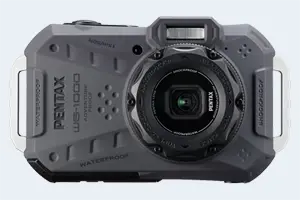Fujifilm X100VI vs Pentax WG-1000
The Fujifilm X100VI and the Pentax WG-1000 are two digital cameras that were revealed to the public, respectively, in February 2024 and June 2024. Both the X100VI and the WG-1000 are fixed lens compact cameras that are based on an APS-C (X100VI) and a 1/2.3-inch (WG-1000) sensor. The Fujifilm has a resolution of 39.8 megapixels, whereas the Pentax provides 15.9 MP.
Below is an overview of the main specs of the two cameras as a starting point for the comparison.

Check X100VI price at
amazon.com

Check WG-1000 price at
amazon.com
Going beyond this snapshot of core features and characteristics, what are the differences between the Fujifilm X100VI and the Pentax WG-1000? Which one should you buy? Read on to find out how these two cameras compare with respect to their body size, their imaging sensors, their shooting features, their input-output connections, and their reception by expert reviewers.
Body comparison
An illustration of the physical size and weight of the Fujifilm X100VI and the Pentax WG-1000 is provided in the side-by-side display below. The two cameras are presented according to their relative size. Three consecutive perspectives from the front, the top, and the back are available. All size dimensions are rounded to the nearest millimeter.
The X100VI can be obtained in two different colors (black, silver), while the WG-1000 is only available in grey.
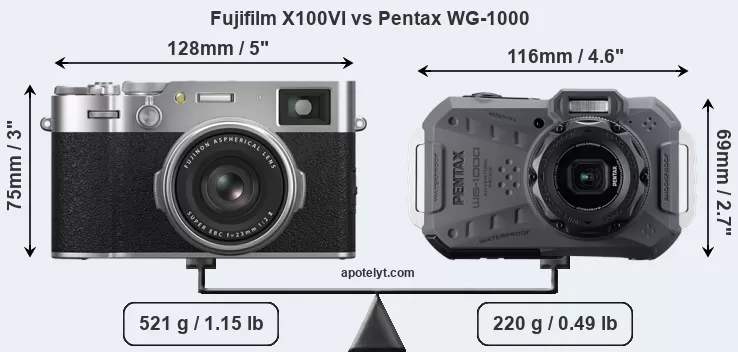

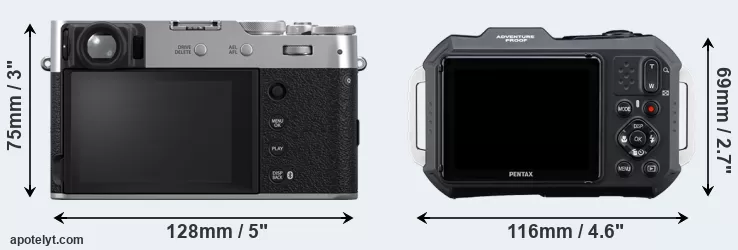
If the front view area (width x height) of the cameras is taken as an aggregate measure of their size, the Pentax WG-1000 is notably smaller (17 percent) than the Fujifilm X100VI. Moreover, the WG-1000 is substantially lighter (58 percent) than the X100VI. In this context, it is worth noting that both cameras are splash and dust-proof and can, hence, be used in inclement weather conditions or harsh environments. More than that, the WG-1000 is water-proof up to 15m and can, thus, be used for underwater photography.
The power pack in the X100VI can be charged via the USB port, so that it is not always necessary to take the battery charger along when travelling.
The adjacent table lists the principal physical characteristics of the two cameras alongside a wider set of alternatives. If you would like to visualize and compare a different camera combination, you can navigate to the CAM-parator app and make your selection from a broad list of cameras there.

| Camera Model |
Camera Width |
Camera Height |
Camera Depth |
Camera Weight |
Battery Life |
Weather Sealing |
Camera Launch |
Launch Price |
Street Price |
||
|---|---|---|---|---|---|---|---|---|---|---|---|
| 1. | Fujifilm X100VI | 128 mm | 75 mm | 55 mm | 521 g | 450 | Y | Feb 2024 | EUR 1 799 | amazon.com | |
| 2. | Pentax WG-1000 | 116 mm | 69 mm | 51 mm | 220 g | 300 | Y | Jun 2024 | EUR 249 | amazon.com | |
| 3. | Fujifilm X-Pro2 | 141 mm | 83 mm | 46 mm | 495 g | 350 | Y | Jan 2016 | EUR 1 799 | ebay.com | |
| 4. | Fujifilm X-Pro3 | 141 mm | 83 mm | 46 mm | 497 g | 440 | Y | Oct 2019 | EUR 1 899 | amazon.com | |
| 5. | Fujifilm X-T2 | 133 mm | 92 mm | 49 mm | 507 g | 340 | Y | Jul 2016 | EUR 1 699 | ebay.com | |
| 6. | Fujifilm X-T3 | 133 mm | 93 mm | 59 mm | 539 g | 390 | Y | Sep 2018 | EUR 1 499 | ebay.com | |
| 7. | Fujifilm X-T4 | 135 mm | 93 mm | 64 mm | 607 g | 500 | Y | Feb 2020 | EUR 1 799 | ebay.com | |
| 8. | Fujifilm X-T5 | 130 mm | 91 mm | 64 mm | 557 g | 580 | Y | Nov 2022 | EUR 1 999 | amazon.com | |
| 9. | Fujifilm X-T50 | 124 mm | 84 mm | 49 mm | 438 g | 305 | Y | May 2024 | EUR 1 499 | amazon.com | |
| 10. | Fujifilm X100V | 128 mm | 75 mm | 53 mm | 478 g | 420 | Y | Feb 2020 | EUR 1 499 | ebay.com | |
| 11. | Fujifilm XP130 | 110 mm | 71 mm | 28 mm | 207 g | 240 | Y | Jan 2018 | EUR 219 | ebay.com | |
| 12. | Nikon W300 | 112 mm | 66 mm | 29 mm | 231 g | 280 | Y | May 2017 | EUR 449 | ebay.com | |
| 13. | Pentax WG-8 | 118 mm | 66 mm | 33 mm | 242 g | 340 | Y | Jun 2024 | EUR 479 | amazon.com | |
| 14. | Pentax WG-90 | 123 mm | 62 mm | 30 mm | 194 g | 300 | Y | Nov 2023 | EUR 379 | amazon.com | |
| 15. | Ricoh WG-60 | 123 mm | 62 mm | 30 mm | 193 g | 300 | Y | Oct 2018 | EUR 249 | ebay.com | |
| 16. | Sony A7C II | 124 mm | 71 mm | 63 mm | 514 g | 540 | Y | Aug 2023 | EUR 2 399 | amazon.com | |
| 17. | Sony A6700 | 122 mm | 69 mm | 64 mm | 493 g | 570 | Y | Jul 2023 | EUR 1 699 | amazon.com | |
| Note: Measurements and pricing do not include easily detachable parts, such as add-on or interchangeable lenses or optional viewfinders. | |||||||||||
The price is, of course, an important factor in any camera decision. The listed launch prices provide an indication of the market segment that the manufacturer of the cameras have been targeting. The WG-1000 was launched at a markedly lower price (by 86 percent) than the X100VI, which puts it into a different market segment. Usually, retail prices stay at first close to the launch price, but after several months, discounts become available. Later in the product cycle and, in particular, when the replacement model is about to appear, further discounting and stock clearance sales often push the camera price considerably down. Then, after the new model is out, very good deals can frequently be found on the pre-owned market.
Sensor comparison
The size of the imaging sensor is a crucial determinant of image quality. All other things equal, a large sensor will have larger individual pixel-units that offer better low-light sensitivity, wider dynamic range, and richer color-depth than smaller pixels in a sensor of the same technological generation. Furthermore, a large sensor camera will give the photographer more possibilities to use shallow depth-of-field in order to isolate a subject from the background. On the downside, larger sensors tend to be more expensive and lead to bigger and heavier cameras and lenses.
Of the two cameras under consideration, the Fujifilm X100VI features an APS-C sensor and the Pentax WG-1000 a 1/2.3-inch sensor. The sensor area in the WG-1000 is 92 percent smaller. As a result of these sensor size differences, the cameras have a format factor of, respectively, 1.5 and 5.6. The sensor in the X100VI has a native 3:2 aspect ratio, while the one in the WG-1000 offers a 4:3 aspect.
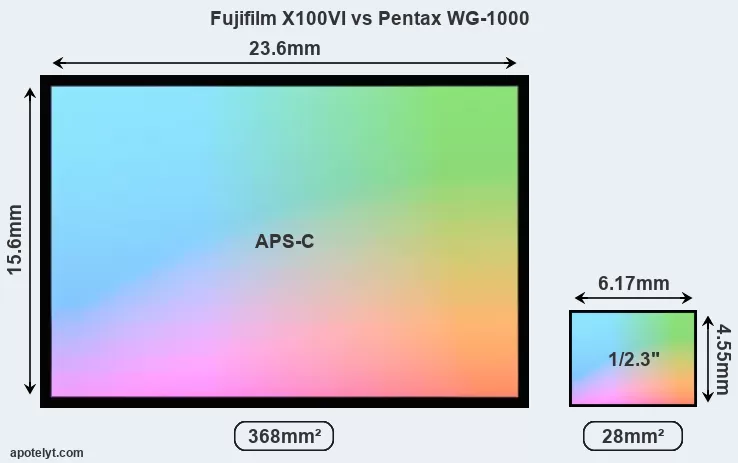
With 39.8MP, the X100VI offers a higher resolution than the WG-1000 (15.9MP), but the X100VI nevertheless has larger individual pixels (pixel pitch of 3.04μm versus 1.33μm for the WG-1000) due to its larger sensor. However, the WG-1000 is a somewhat more recent model (by 3 months) than the X100VI, and its sensor might have benefitted from technological advances during this time that enhance the light gathering capacity of its pixels. Coming back to sensor resolution, it should be mentioned that neither of the two cameras has an anti-alias filter installed, so they are able to capture all the detail the sensor resolves.
The resolution advantage of the Fujifilm X100VI implies greater flexibility for cropping images or the possibility to print larger pictures. The maximum print size of the X100VI for good quality output (200 dots per inch) amounts to 38.6 x 25.8 inches or 98.1 x 65.4 cm, for very good quality (250 dpi) 30.9 x 20.6 inches or 78.5 x 52.3 cm, and for excellent quality (300 dpi) 25.8 x 17.2 inches or 65.4 x 43.6 cm. The corresponding values for the Pentax WG-1000 are 23 x 17.3 inches or 58.5 x 43.9 cm for good quality, 18.4 x 13.8 inches or 46.8 x 35.1 cm for very good quality, and 15.4 x 11.5 inches or 39 x 29.3 cm for excellent quality prints.
The X100VI has on-sensor phase detect pixels, which results in fast and reliable autofocus acquisition even during live view operation.
The Fujifilm X100VI has a native sensitivity range from ISO 125 to ISO 12800, which can be extended to ISO 64-51200. The corresponding ISO settings for the Pentax WG-1000 are ISO 100 to ISO 3200 (no boost).
In terms of underlying technology, the X100VI is build around a BSI-CMOS sensor, while the WG-1000 uses a CMOS imager. The X100VI uses Fujifilm's X-Trans layout of photosites, while the WG-1000 employs the more common Bayer array.
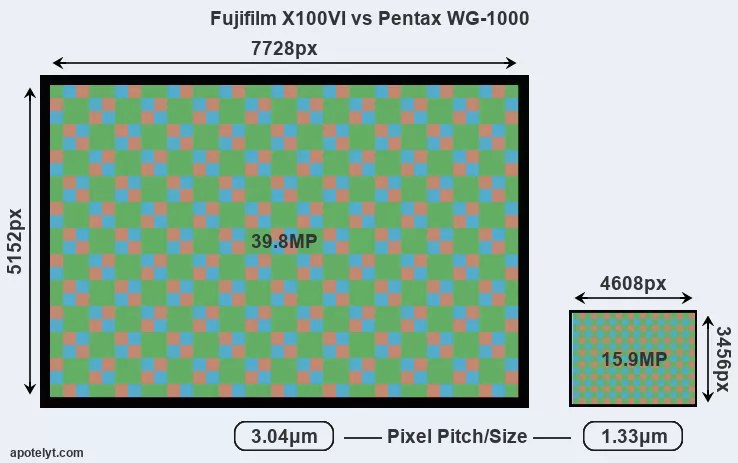
Consistent information on actual sensor performance is available from DXO Mark for many cameras. This service is based on lab testing and assigns an overall score to each camera sensor, as well as ratings for dynamic range ("DXO Landscape"), color depth ("DXO Portrait"), and low-light sensitivity ("DXO Sports"). The adjacent table reports on the physical sensor characteristics and the outcomes of the DXO sensor quality tests for a sample of comparator-cameras.

| Camera Model |
Sensor Class |
Resolution (MP) |
Horiz. Pixels |
Vert. Pixels |
Video Format |
DXO Portrait |
DXO Landscape |
DXO Sports |
DXO Overall |
||
|---|---|---|---|---|---|---|---|---|---|---|---|
| 1. | Fujifilm X100VI | APS-C | 39.8 | 7728 | 5152 | 6.2K/30p | 24.3 | 14.1 | 2397 | 86 | |
| 2. | Pentax WG-1000 | 1/2.3 | 15.9 | 4608 | 3456 | 1080/30p | 20.9 | 12.8 | 1626 | 54 | |
| 3. | Fujifilm X-Pro2 | APS-C | 24.0 | 6000 | 4000 | 1080/60p | 23.7 | 13.0 | 1608 | 80 | |
| 4. | Fujifilm X-Pro3 | APS-C | 26.0 | 6240 | 4160 | 4K/30p | 24.1 | 13.6 | 1968 | 84 | |
| 5. | Fujifilm X-T2 | APS-C | 24.0 | 6000 | 4000 | 4K/30p | 23.8 | 13.1 | 1653 | 81 | |
| 6. | Fujifilm X-T3 | APS-C | 26.0 | 6240 | 4160 | 4K/60p | 24.0 | 13.4 | 1853 | 83 | |
| 7. | Fujifilm X-T4 | APS-C | 26.0 | 6240 | 4160 | 4K/60p | 24.1 | 13.6 | 1995 | 84 | |
| 8. | Fujifilm X-T5 | APS-C | 39.8 | 7728 | 5152 | 6.2k/30p | 24.3 | 13.9 | 2264 | 86 | |
| 9. | Fujifilm X-T50 | APS-C | 39.8 | 7728 | 5152 | 6.2k/30p | 24.3 | 14.1 | 2418 | 86 | |
| 10. | Fujifilm X100V | APS-C | 26.0 | 6240 | 4160 | 4K/30p | 24.2 | 13.6 | 1996 | 84 | |
| 11. | Fujifilm XP130 | 1/2.3 | 15.9 | 4608 | 3456 | 1080/60p | 20.6 | 12.1 | 1000 | 51 | |
| 12. | Nikon W300 | 1/2.3 | 15.9 | 4608 | 3456 | 4K/30p | 20.5 | 12.0 | 938 | 50 | |
| 13. | Pentax WG-8 | 1/2.3 | 20.2 | 5184 | 3888 | 4K/30p | 20.9 | 12.8 | 1626 | 54 | |
| 14. | Pentax WG-90 | 1/2.3 | 15.9 | 4608 | 3456 | 1080/60p | 20.9 | 12.8 | 1570 | 54 | |
| 15. | Ricoh WG-60 | 1/2.3 | 15.9 | 4608 | 3456 | 1080/60p | 20.6 | 12.2 | 1072 | 51 | |
| 16. | Sony A7C II | Full Frame | 32.7 | 7008 | 4672 | 4K/60p | 25.4 | 14.7 | 3237 | 96 | |
| 17. | Sony A6700 | APS-C | 25.6 | 6192 | 4128 | 4K/120p | 24.3 | 14.0 | 2329 | 86 | |
| Note: DXO values in italics represent estimates based on sensor size and age. | |||||||||||
Many modern cameras cannot only take still pictures, but also record videos. Both cameras under consideration have a sensor with sufficiently fast read-out times for moving pictures, but the X100VI provides a higher video resolution than the WG-1000. It can shoot video footage at 6.2K/30p, while the Pentax is limited to 1080/30p.
Feature comparison
Apart from body and sensor, cameras can and do differ across a range of features. For example, the X100VI has an electronic viewfinder (3690k dots), which can be very helpful when shooting in bright sunlight. In contrast, the WG-1000 relies on live view and the rear LCD for framing. The adjacent table lists some of the other core features of the Fujifilm X100VI and Pentax WG-1000 along with similar information for a selection of comparators.

| Camera Model |
Viewfinder (Type or 000 dots) |
Control Panel (yes/no) |
LCD Specifications (inch/000 dots) |
LCD Attach- ment |
Touch Screen (yes/no) |
Max Shutter Speed * |
Max Shutter Flaps * |
Built-in Flash (yes/no) |
Built-in Image Stab |
||
|---|---|---|---|---|---|---|---|---|---|---|---|
| 1. | Fujifilm X100VI | 3690 | n | 3.0 / 1620 | tilting | Y | 1/4000s | 11.0/s | n | Y | |
| 2. | Pentax WG-1000 | none | n | 2.7 / 230 | fixed | n | 1/2000s | 8.0/s | Y | n | |
| 3. | Fujifilm X-Pro2 | 2360 | n | 3.0 / 1620 | fixed | n | 1/8000s | 8.0/s | n | n | |
| 4. | Fujifilm X-Pro3 | 3690 | n | 3.0 / 1620 | tilting | Y | 1/8000s | 8.0/s | n | n | |
| 5. | Fujifilm X-T2 | 2360 | n | 3.0 / 1040 | full-flex | n | 1/8000s | 8.0/s | n | n | |
| 6. | Fujifilm X-T3 | 3690 | n | 3.0 / 1040 | full-flex | Y | 1/8000s | 11.0/s | n | n | |
| 7. | Fujifilm X-T4 | 3690 | n | 3.0 / 1620 | swivel | Y | 1/8000s | 15.0/s | n | Y | |
| 8. | Fujifilm X-T5 | 3690 | n | 3.0 / 1840 | full-flex | Y | 1/8000s | 15.0/s | n | Y | |
| 9. | Fujifilm X-T50 | 2360 | n | 3.0 / 1840 | tilting | Y | 1/4000s | 8.0/s | Y | Y | |
| 10. | Fujifilm X100V | 3690 | n | 3.0 / 1620 | tilting | Y | 1/4000s | 11.0/s | n | n | |
| 11. | Fujifilm XP130 | none | n | 3.0 / 920 | fixed | n | 1/2000s | 10.0/s | Y | Y | |
| 12. | Nikon W300 | none | n | 3.0 / 921 | fixed | n | 1/4000s | 7.0/s | Y | Y | |
| 13. | Pentax WG-8 | none | n | 3.0 / 1040 | fixed | n | 1/4000s | 8.0/s | Y | n | |
| 14. | Pentax WG-90 | none | n | 2.7 / 230 | fixed | n | 1/4000s | 8.0/s | Y | n | |
| 15. | Ricoh WG-60 | none | n | 2.7 / 230 | fixed | n | 1/4000s | 8.0/s | Y | n | |
| 16. | Sony A7C II | 2360 | n | 3.0 / 1037 | swivel | Y | 1/4000s | 10.0/s | n | Y | |
| 17. | Sony A6700 | 2360 | n | 3.0 / 1037 | swivel | Y | 1/4000s | 11.0/s | n | Y | |
| Note: *) Information refers to the mechanical shutter, unless the camera only has an electronic one. | |||||||||||
One differentiating feature between the two cameras concerns the touch sensitivity of the rear screen. The X100VI has a touchscreen, while the WG-1000 has a conventional panel. Touch control can be particularly helpful, for example, for setting the focus point.
The reported shutter speed information refers to the use of the mechanical shutter. Yet, some cameras only have an electronic shutter, while others have an electronic shutter in addition to a mechanical one. In fact, the X100VI is one of those camera that have an additional electronic shutter, which makes completely silent shooting possible. However, this mode is less suitable for photographing moving objects (risk of rolling shutter) or shooting under artificial light sources (risk of flickering).
The Fujifilm X100VI has an intervalometer built-in. This enables the photographer to capture time lapse sequences, such as flower blooming, a sunset or moon rise, without purchasing an external camera trigger and related software.
The WG-1000 is equipped with a zoom lens, while the X100VI comes with a built-in prime. The WG-1000 has a 27-108mm f/3.0-6.6 optic and the X100VI offers a 35mm f/2.0 (focal lengths in full frame equivalent terms). Hence, the Pentax provides a wider angle of view at the short end, as well as more tele-photo reach at the long end than the Fujifilm. The X100VI offers the faster maximum aperture.
Concerning the storage of imaging data, both the X100VI and the WG-1000 write their files to SDXC cards. The X100VI supports UHS-II cards (Ultra High Speed data transfer of up to 312 MB/s), while the WG-1000 cannot take advantage of Ultra High Speed SD cards.
Connectivity comparison
For some imaging applications, the extent to which a camera can communicate with its environment can be an important aspect in the camera decision process. The table below provides an overview of the connectivity of the Fujifilm X100VI and Pentax WG-1000 and, in particular, the interfaces the cameras (and selected comparators) provide for accessory control and data transfer.

| Camera Model |
Hotshoe Port |
Internal Mic / Speaker |
Microphone Port |
Headphone Port |
HDMI Port |
USB Port |
WiFi Support |
NFC Support |
Bluetooth Support |
||
|---|---|---|---|---|---|---|---|---|---|---|---|
| 1. | Fujifilm X100VI | Y | stereo / mono | Y | - | micro | 3.2 | Y | - | Y | |
| 2. | Pentax WG-1000 | - | mono / mono | - | - | - | 2.0 | - | - | - | |
| 3. | Fujifilm X-Pro2 | Y | stereo / mono | Y | - | micro | 2.0 | Y | - | - | |
| 4. | Fujifilm X-Pro3 | Y | stereo / mono | Y | - | - | 3.1 | Y | - | Y | |
| 5. | Fujifilm X-T2 | Y | stereo / mono | Y | - | micro | 3.0 | Y | - | - | |
| 6. | Fujifilm X-T3 | Y | stereo / mono | Y | Y | micro | 3.1 | Y | - | Y | |
| 7. | Fujifilm X-T4 | Y | stereo / mono | Y | - | micro | 3.1 | Y | - | Y | |
| 8. | Fujifilm X-T5 | Y | stereo / mono | Y | - | micro | 3.2 | Y | - | Y | |
| 9. | Fujifilm X-T50 | Y | stereo / mono | Y | - | micro | 3.2 | Y | - | Y | |
| 10. | Fujifilm X100V | Y | stereo / mono | Y | - | micro | 3.1 | Y | - | Y | |
| 11. | Fujifilm XP130 | - | mono / mono | - | - | micro | 2.0 | Y | - | Y | |
| 12. | Nikon W300 | - | stereo / mono | - | - | micro | 2.0 | Y | - | Y | |
| 13. | Pentax WG-8 | - | mono / mono | - | - | - | 3.0 | - | - | - | |
| 14. | Pentax WG-90 | - | mono / mono | - | - | micro | 2.0 | - | - | - | |
| 15. | Ricoh WG-60 | - | mono / mono | - | - | micro | 2.0 | - | - | - | |
| 16. | Sony A7C II | Y | stereo / mono | Y | Y | micro | 3.2 | Y | - | Y | |
| 17. | Sony A6700 | Y | stereo / mono | Y | Y | YES | 3.2 | Y | Y | Y |
It is notable that the X100VI has a hotshoe, while the WG-1000 does not. This socket makes it possible to easily attach optional accessories, such as an external flash gun.
Both the X100VI and the WG-1000 are recent models that are part of the current product line-up. The X100VI replaced the earlier Fujifilm X100V, while the WG-1000 does not have a direct predecessor. Further information on the two cameras (e.g. user guides, manuals), as well as related accessories, can be found on the official Fujifilm and Pentax websites.
Review summary
So how do things add up? Which of the two cameras – the Fujifilm X100VI or the Pentax WG-1000 – has the upper hand? Is one clearly better than the other? Below is a summary of the relative strengths of each of the two contestants.

Arguments in favor of the Fujifilm X100VI:
- More detail: Offers more megapixels (39.8 vs 15.9MP) with a 61% higher linear resolution.
- Better image quality: Features bigger pixels on a larger sensor for higher quality imaging.
- Richer colors: The pixel size advantage translates into images with better, more accurate colors.
- More dynamic range: Larger pixels capture a wider spectrum of light and dark details.
- Better low-light sensitivity: Larger pixels means good image quality even under poor lighting.
- Better video: Provides higher definition movie capture (6.2K/30p vs 1080/30p).
- Better live-view autofocus: Features on-sensor phase-detection for more confident autofocus.
- Better sound: Can connect to an external microphone for higher quality sound recording.
- Easier framing: Has an electronic viewfinder for image composition and settings control.
- Larger screen: Has a bigger rear LCD (3.0" vs 2.7") for image review and settings control.
- More detailed LCD: Has a higher resolution rear screen (1620k vs 230k dots).
- More flexible LCD: Has a tilting screen for odd-angle shots in landscape orientation.
- Fewer buttons to press: Is equipped with a touch-sensitive rear screen to facilitate handling.
- Faster shutter: Has higher mechanical shutter speed (1/4000s vs 1/2000s) to freeze action.
- Faster burst: Shoots at higher frequency (11 vs 8 flaps/sec) to capture the decisive moment.
- Less disturbing: Has an electronic shutter option for completely silent shooting.
- Easier time-lapse photography: Has an intervalometer built-in for low frequency shooting.
- Better light gathering: Has a lens with a wider maximum aperture (f/2.0 vs f/3.0).
- Longer lasting: Can take more shots (450 versus 300) on a single battery charge.
- Easier travel charging: Can be conveniently charged via its USB port.
- Sharper images: Has hand-shake reducing image stabilization built-in.
- Better lighting: Features a hotshoe and can thus hold and trigger an external flash gun.
- Faster data transfer: Supports a more advanced USB protocol (3.2 vs 2.0).
- Easier file upload: Has wifi built in for automatic backup or image transfer to the web.
- Easier wireless transfer: Supports Bluetooth for image sharing without cables.
- Faster buffer clearing: Supports Ultra High Speed (UHS-II) SDXC cards.
- More heavily discounted: Has been on the market for longer (launched in February 2024).

Advantages of the Pentax WG-1000:
- Wider view: Has a wider-angle lens that facilitates landscape or interior shots.
- More compact: Is smaller (116x69mm vs 128x75mm) and will fit more readily into a bag.
- Less heavy: Has a lower weight (by 301g or 58 percent) and is thus easier to take along.
- Water-proof: Is rugged and sealed and can thus be used for underwater photography (up to 15m).
- Easier fill-in: Has a small integrated flash to brighten shadows of backlit subjects.
- More affordable: Was introduced into a lower priced category (86 percent cheaper at launch).
- More modern: Was introduced somewhat (3 months) more recently.
If the number of relative strengths (bullet points above) is taken as a guide, the X100VI is the clear winner of the match-up (27 : 7 points). However, the relative importance of the various individual camera aspects will vary according to personal preferences and needs, so that you might like to apply corresponding weights to the particular features before making a decision on a new camera. A professional wildlife photographer will view the differences between cameras in a way that diverges from the perspective of a family photog, and a person interested in architecture has distinct needs from a sports shooter. Hence, the decision which camera is best and worth buying is often a very personal one.
How about other alternatives? Do the specifications of the Fujifilm X100VI and the Pentax WG-1000 place the cameras among the top in their class? Find out in the latest Best Prime Lens Compact Camera and Best Travel-Zoom Camera listings whether the two cameras rank among the cream of the crop.
In any case, while the comparison of technical specifications can provide a useful overview of the capabilities of different cameras, it says little about, for example, the shooting experience and imaging performance of the X100VI and the WG-1000 in practical situations. At times, user reviews, such as those published at amazon, address these issues in a useful manner, but such feedback is on many occasions incomplete, inconsistent, and unreliable.
Expert reviews
This is where reviews by experts come in. The table below provides a synthesis of the camera assessments of some of the best known photo-gear review sites (amateurphotographer [AP], cameralabs [CL], digitalcameraworld [DCW], dpreview [DPR], ephotozine [EPZ], photographyblog [PB]). As can be seen, the professional reviewers agree in many cases on the quality of different cameras, but sometimes their assessments diverge, reinforcing the earlier point that a camera decision is often a very personal choice.

| Camera Model |
AP score |
CL score |
DCW score |
DPR score |
EPZ score |
PB score |
Camera Launch |
Launch Price |
Street Price |
||
|---|---|---|---|---|---|---|---|---|---|---|---|
| 1. | Fujifilm X100VI | 5/5 | + + | 4.5/5 | 87/100 | .. | 4.5/5 | Feb 2024 | EUR 1 799 | amazon.com | |
| 2. | Pentax WG-1000 | .. | .. | .. | .. | .. | .. | Jun 2024 | EUR 249 | amazon.com | |
| 3. | Fujifilm X-Pro2 | .. | + | .. | 83/100 | 4.5/5 | 4.5/5 | Jan 2016 | EUR 1 799 | ebay.com | |
| 4. | Fujifilm X-Pro3 | 4/5 | + | 4/5 | 85/100 | 4/5 | .. | Oct 2019 | EUR 1 899 | amazon.com | |
| 5. | Fujifilm X-T2 | 5/5 | + + | .. | 86/100 | 4.5/5 | 5/5 | Jul 2016 | EUR 1 699 | ebay.com | |
| 6. | Fujifilm X-T3 | 5/5 | + + | 4.5/5 | 88/100 | 5/5 | 5/5 | Sep 2018 | EUR 1 499 | ebay.com | |
| 7. | Fujifilm X-T4 | 5/5 | + + | 5/5 | 88/100 | 5/5 | 5/5 | Feb 2020 | EUR 1 799 | ebay.com | |
| 8. | Fujifilm X-T5 | 5/5 | + + | 4.5/5 | 90/100 | 4.5/5 | .. | Nov 2022 | EUR 1 999 | amazon.com | |
| 9. | Fujifilm X-T50 | .. | .. | .. | .. | .. | .. | May 2024 | EUR 1 499 | amazon.com | |
| 10. | Fujifilm X100V | 5/5 | + + | 4.5/5 | 86/100 | 5/5 | 4.5/5 | Feb 2020 | EUR 1 499 | ebay.com | |
| 11. | Fujifilm XP130 | .. | o | .. | .. | 3.5/5 | 4/5 | Jan 2018 | EUR 219 | ebay.com | |
| 12. | Nikon W300 | .. | + | .. | .. | 4/5 | 4/5 | May 2017 | EUR 449 | ebay.com | |
| 13. | Pentax WG-8 | .. | .. | .. | .. | .. | .. | Jun 2024 | EUR 479 | amazon.com | |
| 14. | Pentax WG-90 | .. | .. | .. | .. | .. | .. | Nov 2023 | EUR 379 | amazon.com | |
| 15. | Ricoh WG-60 | .. | .. | .. | .. | .. | .. | Oct 2018 | EUR 249 | ebay.com | |
| 16. | Sony A7C II | 4/5 | .. | 4/5 | 87/100 | 4.5/5 | 4.5/5 | Aug 2023 | EUR 2 399 | amazon.com | |
| 17. | Sony A6700 | 4.5/5 | + | 4.5/5 | 88/100 | 4.5/5 | 4.5/5 | Jul 2023 | EUR 1 699 | amazon.com | |
| Note: (+ +) highly recommended; (+) recommended; (o) reviewed; (..) not available. | |||||||||||
The above review scores should be interpreted with care, though. The assessments were made in relation to similar cameras of the same technological generation. A score, therefore, has to be seen in close connection to the price and market introduction time of the camera, and comparing ratings of very distinct cameras or ones that are far apart in terms of their release date have little meaning. Also, please note that some of the review sites have changed their methodology and reporting over time.

Check X100VI price at
amazon.com

Check WG-1000 price at
amazon.com
Other camera comparisons
Did this review help to inform your camera decision process? In case you would like to check on the differences and similarities of other camera models, just make your choice using the following search menu. There is also a set of direct links to comparison reviews that other users of the CAM-parator app explored.
- Canon R6 vs Pentax WG-1000
- Canon SX600 vs Pentax WG-1000
- Canon T1i vs Fujifilm X100VI
- Canon T8i vs Pentax WG-1000
- Fujifilm GFX 100S vs Pentax WG-1000
- Fujifilm X100 vs Fujifilm X100VI
- Fujifilm X100VI vs Hasselblad X1D II
- Fujifilm X100VI vs Leica M-E Typ 240
- Fujifilm X100VI vs Nikon Coolpix A
- Fujifilm X100VI vs Sony RX100 VII
- Nikon Z6 III vs Pentax WG-1000
- Panasonic GH5 II vs Pentax WG-1000
Specifications: Fujifilm X100VI vs Pentax WG-1000
Below is a side-by-side comparison of the specs of the two cameras to facilitate a quick review of their differences and common features.
| Camera Model | Fujifilm X100VI | Pentax WG-1000 |
|---|---|---|
| Camera Type | Fixed lens compact camera | Fixed lens compact camera |
| Camera Lens | 35mm f/2.0 | 27-108mm f/3.0-6.6 |
| Launch Date | February 2024 | June 2024 |
| Launch Price | USD 1,599 | USD 229 |
| Sensor Specs | Fujifilm X100VI | Pentax WG-1000 |
| Sensor Technology | BSI-CMOS | CMOS |
| Sensor Format | APS-C Sensor | 1/2.3" Sensor |
| Sensor Size | 23.6 x 15.6 mm | 6.17 x 4.55 mm |
| Sensor Area | 368.16 mm2 | 28.0735 mm2 |
| Sensor Diagonal | 28.3 mm | 7.7 mm |
| Crop Factor | 1.5x | 5.6x |
| Sensor Resolution | 39.8 Megapixels | 15.9 Megapixels |
| Image Resolution | 7728 x 5152 pixels | 4608 x 3456 pixels |
| Pixel Pitch | 3.04 μm | 1.33 μm |
| Pixel Density | 10.81 MP/cm2 | 56.73 MP/cm2 |
| Moiré control | no AA filter | no AA filter |
| Movie Capability | 6.2K/30p Video | 1080/30p Video |
| ISO Setting | 125 - 12,800 ISO | 100 - 3,200 ISO |
| ISO Boost | 64 - 51,200 ISO | no Enhancement |
| Screen Specs | Fujifilm X100VI | Pentax WG-1000 |
| Viewfinder Type | Electronic viewfinder | no viewfinder |
| Viewfinder Field of View | 100% | |
| Viewfinder Magnification | 0.44x | |
| Viewfinder Resolution | 3690k dots | |
| LCD Framing | Live View | Live View |
| Rear LCD Size | 3.0inch | 2.7inch |
| LCD Resolution | 1620k dots | 230k dots |
| LCD Attachment | Tilting screen | Fixed screen |
| Touch Input | Touchscreen | no Touchscreen |
| Shooting Specs | Fujifilm X100VI | Pentax WG-1000 |
| Focus System | On-Sensor Phase-detect | Contrast-detect AF |
| Manual Focusing Aid | Focus Peaking | no Peaking Feature |
| Continuous Shooting | 11 shutter flaps/s | 8 shutter flaps/s |
| Electronic Shutter | up to 1/180000s | no E-Shutter |
| Time-Lapse Photography | Intervalometer built-in | no Intervalometer |
| Image Stabilization | In-body stabilization | no handshake reduction |
| Fill Flash | no On-Board Flash | Built-in Flash |
| Storage Medium | SDXC cards | SDXC cards |
| Single or Dual Card Slots | Single card slot | Single card slot |
| UHS card support | UHS-II | no |
| Connectivity Specs | Fujifilm X100VI | Pentax WG-1000 |
| External Flash | Hotshoe | no Hotshoe |
| USB Connector | USB 3.2 | USB 2.0 |
| HDMI Port | micro HDMI | no HDMI |
| Microphone Port | External MIC port | no MIC socket |
| Wifi Support | Wifi built-in | no Wifi |
| Bluetooth Support | Bluetooth built-in | no Bluetooth |
| Body Specs | Fujifilm X100VI | Pentax WG-1000 |
| Environmental Sealing | Weathersealed body | Waterproof body (15m) |
| Battery Type | Fujifilm NP-W126S | Pentax D-LI96 |
| Battery Life (CIPA) | 450 shots per charge | 300 shots per charge |
| In-Camera Charging | USB charging | no USB charging |
| Body Dimensions |
128 x 75 x 55 mm (5.0 x 3.0 x 2.2 in) |
116 x 69 x 51 mm (4.6 x 2.7 x 2.0 in) |
| Camera Weight | 521 g (18.4 oz) | 220 g (7.8 oz) |

Check X100VI price at
amazon.com

Check WG-1000 price at
amazon.com
Did you notice an error on this page? If so, please get in touch, so that we can correct the information.
